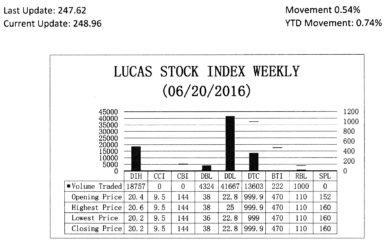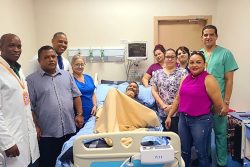Steadfast
Last year, this writer looked at the Massy Group of Companies formerly Neal and Massy to gain an understanding of the operations of this company which has been doing business in Guyana for the past 48 years. Given the integral role that the company plays in the Guyana economy, it is worth taking another look at its performance for the financial year 2015 to update one’s understanding of a company which has quietly expanded its operations through the years and is penetrating a growing number of sectors in the country. For those who might not know, Massy before the rebranding exercise in 2014 was in existence for 82 years under the name of Neal and Massy. The company has its headquarters in Trinidad and Tobago and came about as a result of a merger between Neal Engineering Company and Massy Limited in 1932. One outcome of the merger was the establishment of a public company in 1958. Another was the establishment of a subsidiary in Guyana in 1968. It is to the latter that interest will turn eventually in this article.
 Over the years, Massy has remained steadfast in its participation in the Guyana economy. But the growth of the company was not only focused on Guyana. Massy undertook several initiatives to expand its operations, including the expansion into other territories in the Caribbean and the diversification of products and services offered to its customers. As a consequence, the Massy Group is today a large conglomerate that is organized as business segments or business units that cover the range of products and services offered by the company in several countries in the North American and Latin American and Caribbean regions. Despite being in Guyana for 48 years, very little is said or discussed about a company that has been integral to the expansion and alteration of the Guyana economy for a very long time. It is for this reason that this column, once again, seeks to examine the role and place of this organization in Guyana.
Over the years, Massy has remained steadfast in its participation in the Guyana economy. But the growth of the company was not only focused on Guyana. Massy undertook several initiatives to expand its operations, including the expansion into other territories in the Caribbean and the diversification of products and services offered to its customers. As a consequence, the Massy Group is today a large conglomerate that is organized as business segments or business units that cover the range of products and services offered by the company in several countries in the North American and Latin American and Caribbean regions. Despite being in Guyana for 48 years, very little is said or discussed about a company that has been integral to the expansion and alteration of the Guyana economy for a very long time. It is for this reason that this column, once again, seeks to examine the role and place of this organization in Guyana.
Business architecture
Before narrowing the focus, it would be useful to present the business architecture of the company. It will help to create a sense of the importance of Massy’s operations in Guyana to the group as a whole. The Massy Group continues to operate as a complex business consisting of six business units, six subsidiaries and three associate companies that conduct operations in 11 countries. In four of the 11 locations, it has one product line while it has multiple product lines in the rest. For example, Massy operates a distribution service in Miami in the United States of America (USA). It operates an insurance service in Curaçao and a retail service in St Vincent and the Grenadines. It also operates a technical support service in Suriname. The remaining countries in which multiple operations take place are Antigua & Barbuda, Barbados, Colombia, Guyana, Jamaica, Saint Lucia and Trinidad & Tobago.
The business units cut across several economic sectors and remain the core of its operations. The business units consist of the Automotive and Industrial Equipment unit which controls eight separate companies that sell cars to consumers and heavy equipment to businesses. Then there is the Energy and Industrial Gases Business Unit which controls 18 companies with a similar market focus. The Insurance Unit comprises one company while the Information Technology and Communications Business Unit has control over 10 companies. The Integrated Retail Unit has control over 14 companies. The Finance segment also has six companies in its portfolio. The six business units not only reflect the structure of the organization, they also reflect the business strategy of the entity. Some of the business units have expanded their services or added new services to their portfolio. For example, Massy Communications has extended its business to business Internet and TV service to its consumer market.
Markets

The Lucas Stock Index (LSI) rose 0.54 per cent during the third period of trading in June 2016. The stocks of six companies were traded with 79,573 shares changing hands. There were three Climbers and one Tumbler. The stocks of Banks DIH (DIH) rose 1.98 per cent on the sale of 18,757 while the stocks of Demerara Distillers Limited (DDL) rose 5.26 per cent on the sale of 41,667 shares. In addition, the stocks of Demerara Tobacco Company (DTC) rose 1.51 per cent on the sale of 13,603 shares. In contrast, the stocks of Demerara Bank Limited (DBL) fell 5.26 per cent on the sale of 4,324 shares. In the meanwhile, the stocks of Guyana Bank for Trade and Industry (BTI) and Republic Bank Limited (RBL) remained unchanged on the sale of 222 and 1,000 shares respectively.
As part of its overall strategy, the Massy Group has developed two sets of markets. The Group has dissected its market into business and consumer segments and uses them to deliver its products and services to users. The dual market strategy remains the dominant strategy of the company and is practised in seven of the 11 countries. For the Caricom region, this would be Antigua & Barbuda, Barbados, Guyana, St Lucia, and Trinidad and Tobago. For Latin America, this would be Colombia. One market is for business customers while the other is for consumers. The automotive, finance, insurance and retail businesses were directed at consumers while the industrial equipment, industrial gases, distribution and logistics, and the technology businesses were directed at other businesses. Now, Internet and TV services are also reaching household customers.
Guyana
Guyana is one of the five countries in which Massy has substantial investments. In fact, it is the third most important geographic market for the company when measured in assets, sales revenue and profits. Before discussing Guyana’s importance to the company, it remains important for readers to understand how Guyana fits into the overall Massy structure.
Guyana was the earliest market into which Massy ventured as a foreign investor. The company came to Guyana in 1968 as Neal and Massy 10 years after it went public. At the time of Neal and Massy’s entry, Guyana was two years into its independence. The arrival of Neal and Massy saw the establishment of Associated Industries Limited (Ainlim). In a short history of itself, Massy reported that after its first 20 years in Guyana, the entity had control of four businesses. These were Ainlim, Demerara Oxygen Company (Docol), Transport Services and Demerara Property Investments. In its second 20 years, Massy made further adjustments to its portfolio in Guyana. During this latter period, Massy added Complete Computer Services, NM Services and NM Security. The Massy organization went through a rebranding exercise which resulted in all its companies carrying the Massy name alone. As such Ainlim is now known as Massy Industries, Docol is now known as Massy Gas while Transportation Services is now known as Massy Trading and Distribution. Complete Computer Services is known as Massy Technologies and NM Services is called Massy Services. One other company, NM Security, is now called Massy Security.
Each of the above companies is part of a larger business unit. Massy Industries is part of the Automotive and Industrial Engineering business unit. Its market focus is on other businesses in Guyana and provides capital assets. Massy Industries therefore serve the business community in Guyana. Massy Gas operates under the Energy and Industrial Gases business unit.
Like Massy industries, it serves the business community. Massy Trading and Distribution operates under the Integrated Retail (IR) business unit. Despite being under the IR business unit, the annual report lists it as a company that focuses on serving other businesses. In fact, it is the automotive component of the Automotive and Industrial Engineering business unit that serves the consumer market. The services that are provided through MoneyGram and Sure Pay of the Massy’s Finance unit are also directed at the consumer market.
Large company
As could be expected, a company with that many parts and locations controls a lot of assets. The Massy Group by Guyana’s standards is a large company. According to the 2015 Annual Report of the Group, it had approximately G$323 billion in assets under its control which helped it to generate an estimated G$385 billion in revenues. The Massy operations in Guyana remain a vital part of the Group’s success. The company admitted in its 2014 Annual Report that the good fortunes that the gold and rice industries enjoyed contributed immensely to the economic success reported by the company in that performance year. Emboldened by the business prospects in Guyana, the Massy Group in Guyana opened a 75,000 square foot warehouse facility with modern inventory and warehousing amenities. However, things were not as bright in 2015 on account of the lower price of gold during that year.
Concerns
But Massy’s operations in Guyana are not without problems. Two things are of great concern to the organization. One is safety and the other is customer service. Any Guyanese could understand why the company would be concerned about safety, particularly as it relates to road safety. The company in Guyana had many near misses and two fatal accidents in less than two months in 2014. While the company reports improvements in its health and safety posture, vehicular accidents in Guyana continue to be a problem.
(To be continued)





